Breakfast-debate with Lluis Saurí, Head of Unit of the Economists Team of the Directorate-General for Competition of the European Commission
On Thursday, 19 January, the Official Spanish Chamber of Commerce in Belgium and Luxembourg held, within the framework of its Working Committee “Competence Spain“, a hybrid breakfast-debate with Lluís Saurí Romero, Head of Unit of the Economists Team of the Directorate-General for Competition of the European Commission (DG COMP). The presentation was on “Competition policy, green transition and sustainability objectives”.
The breakfast-debate started with a brief introduction by Miguel Troncoso, President of the Chamber’s “Competencia España” Working Committee. Saurí then began his speech by contextualising the need to carry out a rigorous control of State aid that facilitates maintaining the criteria of efficiency and competition in the markets in a post-COVID era and in the current framework of the energy crisis.
The decarbonisation that the European Green Deal envisages for 2050 is one of the challenges that Saurí mentioned as an example of the need to emphasise resource efficiency through the control of State aid.
Market distorsions
With the successive crises of recent years, public investment has taken on a special role. As Saurí explained, this state aid must be duly audited to ensure that its impact is as intended by the institutions, as these injections of capital inevitably cause distortions in the market.
In this respect, the challenge lies, in Saurí’s words, in finding a balance that “facilitates the achievement of objectives while minimising risks”. The speaker also explained several of the criteria that make it possible to resolve this coexistence between economic incentive and distortion of competition.
During his speech, Saurí also gave a brief historical review of State aid control, analysed how this control must be adapted to the circumstances of each historical moment and defended the fact that, if carried out correctly, State aid control can be “a good instrument for designing intelligent industrial policies”.
After the speaker’s intervention, there was a Q&A session in which attendees were able to share their concerns on the subject under debate.
Virtual breakfast-debate with Sergio Baches Opi from the EC Legal Service
The Official Spanish Chamber of Commerce in Belgium and Luxembourg has hosted on Wednesday 29th June a new virtual breakfast-debate with Sergio Baches in the framework of the working group “Competition Spain”, a committee in which member companies of the Chamber address specific issues and aspects of European Competition Law and Policy that may affect them; or in which they are interested in deepening with the aim of positioning Spain as a leader in this field within the european sphere.
The event, followed by almost 20 companies, was led by Sergio Baches Opi, member of the legal service of the European Commission, who reviewed the recent jurisprudence of the Court of Justice on cartels and presented the most relevant cases of the last two years in this area: from the condenser cartel or the electrical cable cartel to the ‘Sumal case’.
Miguel Troncoso, President of the working group “Competition Spain”, acted as moderator during the webinar; in which he also encouraged participants to reflect on the scope of responsibility for the actions of the different parties that integrate a sanctioned company.
After an intense year of CJEU jurisprudence, Baches Opi has summarised the arguments used by the Executive of the European Union to determine whether or not there is bid rigging by the companies accused, and when the subsidiary can be held liable for the conduct of its parent company “directly” involved in the infraction.
Online breakfast debate with Cristina Lobillo Borrero, Head of Energy Policy at DG ENER
Last Thursday 10 February 2022, the Official Spanish Chamber of Commerce in Belgium and Luxembourg organised a new virtual breakfast-debate within the cycle “Business Circle”, a meeting platform between Spanish companies and representatives in the European institutions. Cristina Lobillo Borrero, Director of Energy Policy at DG ENER of the European Commission, participated in the debate.
The President of the Chamber and moderator of the event, Pablo López Álvarez, welcomed and briefly introduced the speaker, summarising her professional career. He also thanked all the attendees for their presence.
This was followed by Eva Chamizo, Director of European Affairs and Iberdrola’s Brussels office. In her speech, she mentioned the priorities and concerns of her company.
Cristina Lobillo began her speech by summarising the current situation in the energy sector and the temporary pressure on energy prices. She also gave an introduction to the awareness and investment process that the European Commission is currently considering.
The energy transition and cooperation between countries were the main themes of his speech throughout his intervention. After the introduction, Lobillo pointed out the current need to defend a diversification strategy, on the basis of which work has been carried out with the USA, given the decrease in the percentage of gas storage in the European Union. In this respect, Lobillo assured that the current measures against this crisis are only transitory, as the Commission has not abandoned, in any case, the priorities and actions to comply with the proposed energy transition.
Finally, Cristina Lobillo spoke about taxonomy, the guide for moving from coal to gas and from there to renewable energies. At this point, she emphasised the three activities that the Commission has identified and which should be the subject of investment.
During the question and answer session, the attendees were able to express their doubts and comments on numerous current issues. The speaker spoke about the efforts and security of supply of EU member states, the existing financing mechanisms for green hydrogen and blue hydrogen, and the countries that are most committed to renewable energies.
The Official Spanish Chamber of Commerce in Belgium and Luxembourg would like to thank Cristina Lobillo Borrero, Iberdrola and all the participants for their participation.
Online Breakfast-Debate with Luis Garicano, MEP, Head of Ciudadanos Delegation to the European Parliament, Vice-President and Economic Coordinator of Renew Europe
On Friday the 4th of June 2021, the Official Spanish Chamber of Commerce in Belgium and Luxembourg organized a virtual debate within the scope of its platform “Desayunos con la Eurocámara”(Breakfast with the Eurochamber), created with the aim of bringing the EU Parliament´s debates closer to Spanish companies. As part of these debates we invited MEP Luis Garicano, Head of Ciudadanos Delegation to the European Parliament, Vice-President and Economic Coordinator of Renew Europe.
The topic of this debate was “The priorities of the Renew Europe group for this legislature”.
Pablo López Álvarez, Vice-President of the Chamber and moderator of the event, welcomed the participants and briefly presented the speaker, whose presence, together with the participants’, he acknowledged.
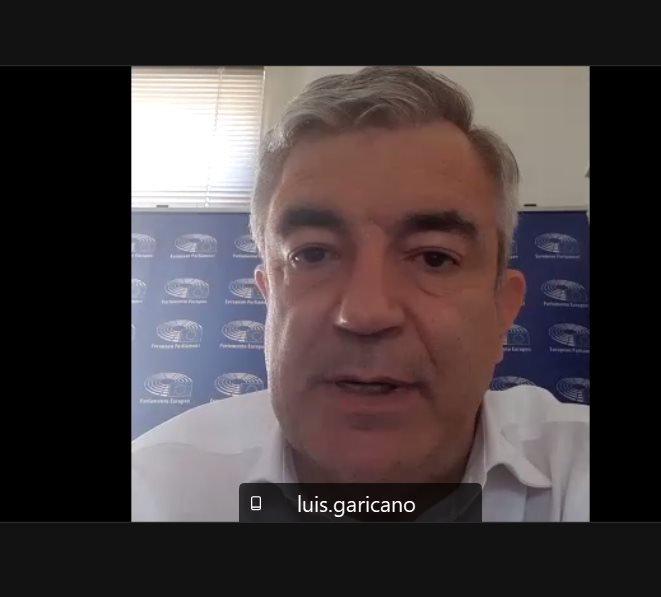 MEP Garicano analyzed, in the first place, the current situation of the Next Generation European recovery funds as well as the establishment of a Resiliency and Control Mechanism by the European Commission.
MEP Garicano analyzed, in the first place, the current situation of the Next Generation European recovery funds as well as the establishment of a Resiliency and Control Mechanism by the European Commission.
The speaker positively assessed the consensus reached within the Renew Europe group in these matters, as well as the responsibility of the Spanish and Italian representatives to show the efficiency of NGEU and React EU funds.
Thereupon MEP Garicano highlighted the different spending criteria and conditions established by the European Commission and supervised by the European Council through the European Semester. He also highlighted the low materialization achieved in matters such as the maintenance of market unity and the importance of complying with the required measures in social services and employment.
Next, the speaker explained the different transparency accomplishments of Renew Group in the European Parliament, regarding supervision, access and control rights by the Antifraud Office and the European Court of Auditors. Additionally, MEP Garicano expressed his concern about the European recovery funds management. In this sense, he centered his speech on the funds oriented at training programs or the low investment in youth employment.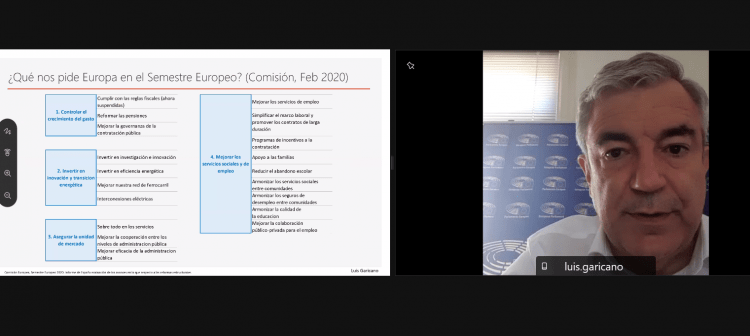
During the Q&A session, the participants were able to express their doubts and to make comments about numerous matters of interest. Thus, different topics were discussed such as the lack of competition in certain technological sectors in Spain comparing to other European countries, the PERTE allocation criteria, SME’s position to access these aid funds, regulatory challenges in the European liberalization of the telecommunications sector and finally the disparities between the allocation of European funds.
Finally, MEP Garicano concluded his intervention by highlighting the lack of political consensus as one of the main barriers to an effective European funds’ distribution, which were closely analyzed.
The Official Spanish Chamber of Commerce in Belgium and Luxembourg would like to wholeheartedly express its gratitude to MEP Luis Garicano for his participation in the debate and to all participants for their presence.
Online Breakfast-Debate with Nicolás González Casares, MEP, Member of the Special Committee on Beating Cancer and of the Committee on Industry, Research and Energy and substitute for the Committee on the Environment, Public Health and Food Safety
On 2nd of June 2021, the Official Spanish Chamber of Commerce in Belgium and Luxembourg organized a virtual debate within the scope of its platform “Desayunos con la Eurocámara”(Breakfast with the EuroChamber), created with the aim of bringing the EU Parliament´s debates closer to Spanish companies. As part of these debates, the MEP Nicolás González Casares, member of the Special Committee on Beating Cancer (BECA), the Commission of Industry, Research and Energy and substitute in the Commission of Environment, Public Health and Food Safety was invited.
The topic of this debate was “The role of the BECA Committee in the European plan to fight cancer”
Pablo López Álvarez, Vice-President of the Chamber and moderator of the event, welcomed the participants and briefly presented the speaker, whose presence, together with the participants’, he acknowledged.
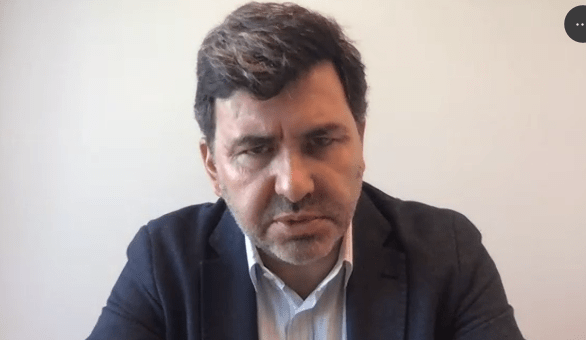 Nicolás González discussed, in the first place, the importance of BECA Commission to design strategies to prevent cancer expansion within the European Union.
Nicolás González discussed, in the first place, the importance of BECA Commission to design strategies to prevent cancer expansion within the European Union.
Thereupon the speaker highlighted the different inequalities originated since the start of the pandemic regarding early cancer diagnosis and access to treatment amongst member states, especially in southern and eastern Europe, and explained the important work carried out by the BECA Committee, created in June 2020, in terms of implementing prevention measures.
MEP González also highlighted the actions carried out by the Commission regarding the fight against tobacco, presenting the importance of advancing the revision of the EU Commission directive scheduled for 2023.
Following on, the speaker explained the different key dates established by the Committee, such as the deadline for the draft proposal, scheduled for the 17th of June, amendments presentation on the 14th of September or the final vote to be casted on the 6th of December, prior to the Committee’ dissolution the 23rd of December.
During the Q&A session, the participants were able to express their doubts and to make comments about numerous matters of interest. Thus, different topics were discussed such as the importance of implementing shared health data systems, the roles of tobacco’ alternatives, the effect of diets on the mitigation of possible carcinogenic effects of wine, the Spanish anti tobacco law’ effectiveness, the European Medicines Agency or the European vaccination card’ implementation.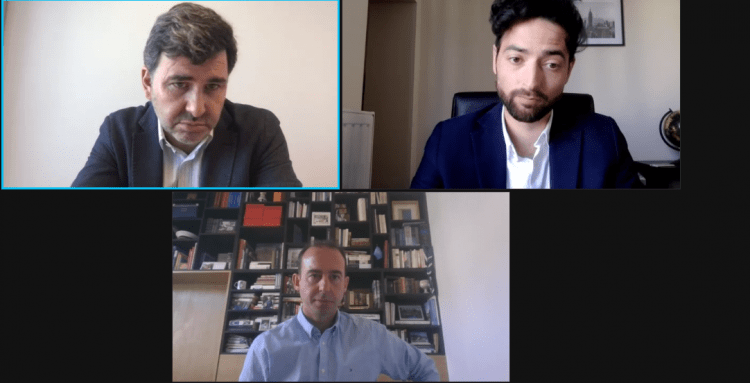
In his view, the creation of databases at an European level with the aim of reducing inequalities between member states is fundamental, as well as exploiting the increase in vaccine production capability derived from the pandemic.
The speaker also expressed his wish to give continuity to the Committee once dissolved the 23rd of December through a constant dialogue with the European Commission in order to propose legislative initiatives, such as new product labeling obligations on alcoholic beverages. He also expressed the importance of the EU to coordinate and establish wide political lines in public health policy, as well as its duty to expand these activities amongst all member states.
The Official Spanish Chamber of Commerce in Belgium and Luxembourg would like to wholeheartedly express its gratitude to the MEP Nicolás González for his participation in the debate and to all participants for their presence.
Online Breakfast-Debate with Javier Moreno Sánchez, MEP of the Group Progressive Alliance of Socialists and Democrats of the European Parliament.
On Tuesday the 11th of May, 2021 the Official Spanish Chamber of Commerce in Belgium and Luxembourg organized another virtual debate in the scope of its platform “Desayunos con la Eurocámara”(Breakfast with the Eurochamber), created with the objective to bring the EU Parliament debates closer to Spanish companies. As part of this debates MEP Javier Moreno Sánchez was invited from the Group of the Progressive Alliance of Socialists and Democrats.
The topic of this debate was “Priorities of European Socialist parties for this political term”.
Pablo López Álvarez, Vice-President of the Chamber and moderator of the event, welcomed the participants and briefly presented the speaker, whose presence, together with the participants’, he acknowledged.
Javier Moreno briefly discus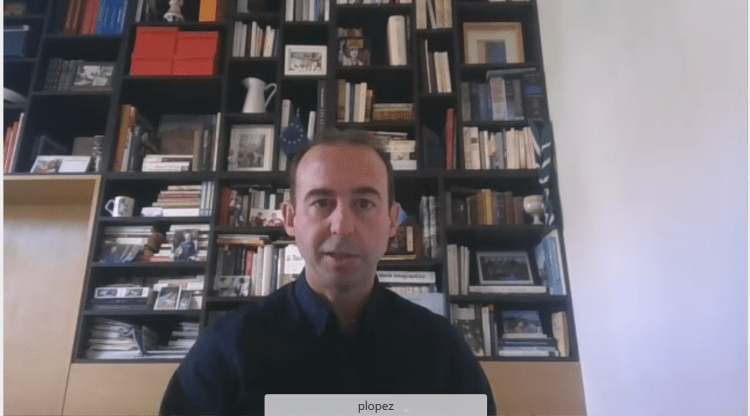 sed in the first place the fast and agile pandemic’ management by the European Union, remarking the important task undertaken by the Parliament and the Group of the Progressive Alliance of Socialists and Democrats in the health emergency funds’ unblocking in March of 2020 and during the pandemic.
sed in the first place the fast and agile pandemic’ management by the European Union, remarking the important task undertaken by the Parliament and the Group of the Progressive Alliance of Socialists and Democrats in the health emergency funds’ unblocking in March of 2020 and during the pandemic.
MEP Moreno also highlighted the good response provided against the challenged occurred during this historical year, such as the Brexit negotiation and the health situation, together with preserving democracy and rule of law in the different member states.
Thereupon the speaker explained the different priorities of his group. As top priority, he highlighted the recovery of social life through the European vaccination campaign, together with the facilitation of European mobility through the so-called Covid Certificate. He also underlined the vital importance of implementing the economic recovery plans with an economic and digital transformation scope, while taking into account gender equality and creating job opportunities for the younger generations.
The speaker also established immigration policy management as one of his Group’s main challenge, which will rely on the Blue Card initiative, with the objective of facilitating the arrival of highly qualified workers. MEP Moreno also defined CAP reform as a main challenge in which the group is actively involved.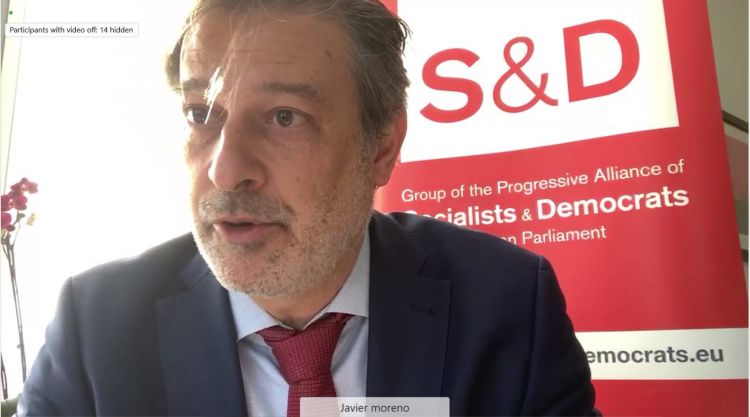
During the Q&A session, the participants were able to express their doubts and to make comments about numerous matters of interest. Thus, different topics were discussed such as the European card for disabled people, the challenges and opportunities derived from MERCOSUR changes or the Conference on the Future of Europe.
From the speaker’s point of view, it is critical to take advantage of the opportunities from the pandemic to reinforce the EU commercial position in South America, as well as transmitting to the EU citizens the successful implementation of initiatives such as the Conference on the Future of Europe in order to encourage a higher participation in the upcoming EU election. Regarding the European card for disabled people, the speaker remarked that the delegation is hearing societies’ needs through amendments to facilitate the Covid Certificate to disabled people, as well as streamline the implementation of the European card for this group of people.
The Official Spanish Chamber of Commerce in Belgium and Luxembourg would like to wholeheartedly express its gratitude to MEP Javier Moreno for his participation in the debate and to all participants for their presence.
Online Breakfast-Debate with Mirzha de Manuel, Member of the Cabinet of Executive Vice President Valdis Dombrovskis for an Economy that Works for People.
Last Friday April 23 2021, the Official Spanish Chamber of Commerce in Belgium and Luxembourg organised a new virtual breakfast-debate in the framework of its “Business Circle” platform. Mirzha de Manuel, Member of the Cabinet of Executive Vice President Valdis Dombrovskis for an Economy that Works for People in the European Commission, participated in the debate. The topic of the breakfast was “Post-Covid economic recovery perspectives and the role of the Recovery and Resilience Facility.”
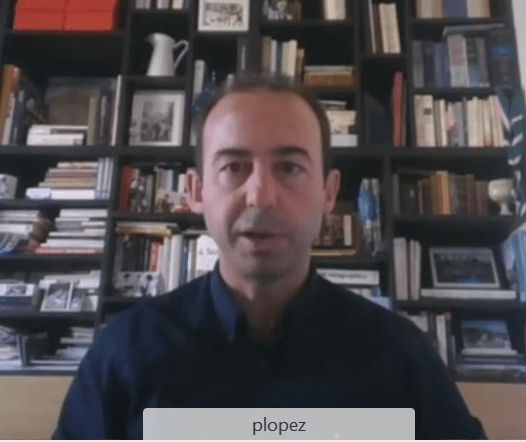 Pablo López Álvarez, Vice-President of the Chamber and moderator of the event, welcomed and briefly introduced the speaker and thanked him and all the attendees for their presence.
Pablo López Álvarez, Vice-President of the Chamber and moderator of the event, welcomed and briefly introduced the speaker and thanked him and all the attendees for their presence.
Mirzha de Manuel began by explaining the great success of the 100 billion investment launched by the EU. This recovery plan to overcome the economic and social struggles caused by the coronavirus pandemic was agreed by the European Commission, the European Parliament and EU leaders. This plan, unprecedented in its scale and content, contains short and long-term goals that are very important for Member States to generate sustained and sustainable growth. In addition, he stressed that all investments made by Member States related to the economic recovery from the pandemic are eligible for funding under various EU mechanisms, such as the SURE program. Finally, de Manuel stressed the importance of social dialogue as a frame of reference for tackling current problems, drawing up recovery plans and ensuring that the solutions have strong social backing.
During the Q&A session, attendees were able to express their doubts and comments on numerous issues of interest. Thus, issues such as the importance of the consultation of the recovery plans, the degree of development of the recovery and resilience plans, the Commission’s view on the draft presented by Spain as well as the opportunity to make a more European format for the post-covid recovery strategy were discussed.
The Official Spanish Chamber of Commerce in Belgium and Luxembourg would like to thank Mirzha de Manuel and all the attendees for their participation.
Online Breakfast-Debate with Dolors Montserrat, MEP of the European People’s Party and President of the Committee on Petitions of the European Parliament
Last Friday April 16th 2021, the Official Spanish Chamber of Commerce in Belgium and Luxembourg organised a new virtual breakfast-debate in the framework of its “Breakfast with the European Parliament” framework, a platform to bring European Parliament debates closer to our companies. Dolors Monserrat, MEP of the European People’s Party (EPP) and Chair of the Petitions Committee, took part in the debate.
The topic of the breakfast was “The priorities of the European People’s Party for this legislature”.
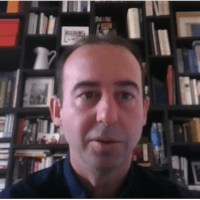 Pablo López Álvarez, Vice-President of the Chamber and moderator of the event, welcomed and briefly introduced the speaker and thanked her and all the attendees for their presence.
Pablo López Álvarez, Vice-President of the Chamber and moderator of the event, welcomed and briefly introduced the speaker and thanked her and all the attendees for their presence.
Dolors Monserrat first briefly addressed the priority of health and jobs and their complementarity for the European People’s Party. She stressed that Europe is experiencing the greatest crisis since the Second World War and that the EU needs to work resolutely to overcome the consequences of this crisis. The objective of the EU action and the strategy led by the EPP is to limit the economic and social impact of the crisis as much as possible.
Then, Dolors highlighted the different priorities of the EPP parliamentary group. These priorities include first the health field, followed by the economic field with decisive support for the most affected sectors (industry, tourism, SMEs, etc.) and promoting Europe’s leadership in the world during the current crisis.
She also underlined the enormous importance of the European recovery funds for Spain in order to face a new industrialisation (R&D) and modernisation of its economy. She also stressed the importance of stable job creation for a successful economic recovery for all Member States.
During the Q&A session, attendees were able to express their doubts and comments on numerous issues of interest. Thus, topics such as doubts about the vaccination plan in Spain, the elimination of inequalities for people with disabilities in the management of medical data (Big Data) or the difficulties encountered by Spanish companies in finding information on available European funds were discussed.
From the Official Spanish Chamber of Commerce in Belgium and Luxembourg we would like to thank Dolors Montserrat and all the attendees for their participation.
ABOUT US
The Official Spanish Chamber of Commerce in Belgium and Luxembourg is a non-profit association whose main objective is the development of trade and investments between Spain, Belgium and Luxembourg. The Chamber offers to the companies a wide range of commercial and promotional services as well as professional contacts and facilitates business networking among its partners.
CONTACT
Belgium
Avenue des Arts 1-2,
1210, Brussels, Belgium
Tel. +32 2 517 17 40
info@e-camara.com
Luxembourg
Tel. +352 661 404 399
luxemburgo@e-camara.com



